A few weekends ago (May 21), Nicole and I went to the pleasant town of Ottignies for the Prix Renaissance de la Nouvelle. Now in its 20th year, this short story prize, sponsored by the French Community of Belgium, is awarded annually to a single collection in French. It has honored a variety of writers from over 17 different publishers, including such noted French doyennes of the form as Annie Saumont, Linda Le, Marie-Hélène Lafon, and Véronique Bizot, as well as Belgians Vincent Engel and Georges Thinès.
We were there at the invitation of Michel Lambert, the founder of the prize, and a close friend of Georges-Olivier Châteaureynaud, who has served on the prize jury since its inception. Lambert, himself a noted short story writer in the classical realist tradition, is also the editor of Le Carnet et Les Instants, the official magazine of the Belgian French Community’s Service for the Promotion of Letters.
While short story writers everywhere are wont to grumble about being practitioners of a beleaguered, unloved form, Francophone writers have particular cause for complaint in comparison with their American counterparts, who benefit from a much more extensive support network in academia. There is no equivalent in France (or Belgium for that matter) for the infrastructure American universities provide short story culture: a haven and last bastion of surprising vitality. However under-read and underfunded, journals and reviews provide a constant showcase for stories, for which periodical publication opportunities in France are far more infrequent. It’s possible that, as Chad Harbach argues in Slate and n+1, the MFA’s institutionalization made the short story a “primary pedagogical form”; whatever the cause, the form’s now de rigueur inclusion on the syllabi of not only creative writing but literature courses increases its general exposure, effectively gracing it with the fickle immortality of canon.
And so, to draw attention to their craft in Francophonia, short story writers band together to found prizes like this one, which will hopefully bring about the renaissance of its name. As Châteaureynaud put it to me, “Novelists are all in constant competition with each other. There’s isn’t the same sense among short story writers… they know they’re few and far between, so they lend each other helping hands, and form a kind of mafia.” I noted, among the past winners, Sylvain Jouty and Hubert Haddad, two members of La Nouvelle Fiction (The New Fiction, or Neofiction), a literary movement Châteaureynaud helped found: “New” because it rose up against the prevailingly minimalist and confessional tendencies of contemporary French writing, seeking to rouse it from “the slumber of psychological realism,” and to restore myth, fable, and fairy tale to a place of primacy.
The prize ceremony was held at the Ferme du Douaire, a former country farm now a bit at sea between the main thoroughfare through town and the parking lot of a supermarket-anchored strip mall, though in the sandy, intact courtyard of the farm these modern neighbors faded away. One of the stone barns housed the municipal library and, the one beside it was the auditorium where we sat, staring up occasionally at the dark, aged rafters with their steel braces. This year’s winner was Scholastique Mukasonga, for her collection L’Iguifou: nouvelles rwandaises, published by Gallimard’s “Dark Continent” imprint (a name that, unfortunately, translates rather poorly). The author of two previous novels, the Rwandan Mukasonga now lives in Normandy. Her collection takes its title from the Rwandan word “igifu,” which refers to insatiable hunger. The author read from these harrowing tales of the genocide, and related her long path to becoming not only a writer, but one who could write unflinchingly about such matters.
Later, we all retired to the Château de Limelette, a a nearby hotel-restaurant in a verdant, rustic setting. The extensive landscaped property looked like a popular wedding spot. At the end of the banquet, a cake was brought out for the happy winner, to celebrate the 20th anniversary of the prize.
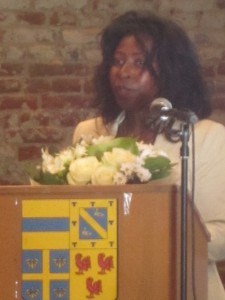
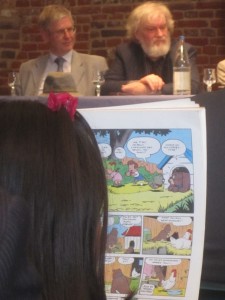
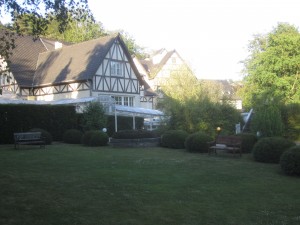
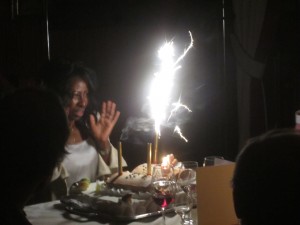
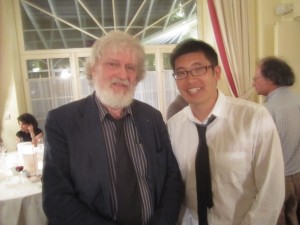
Leave a Reply